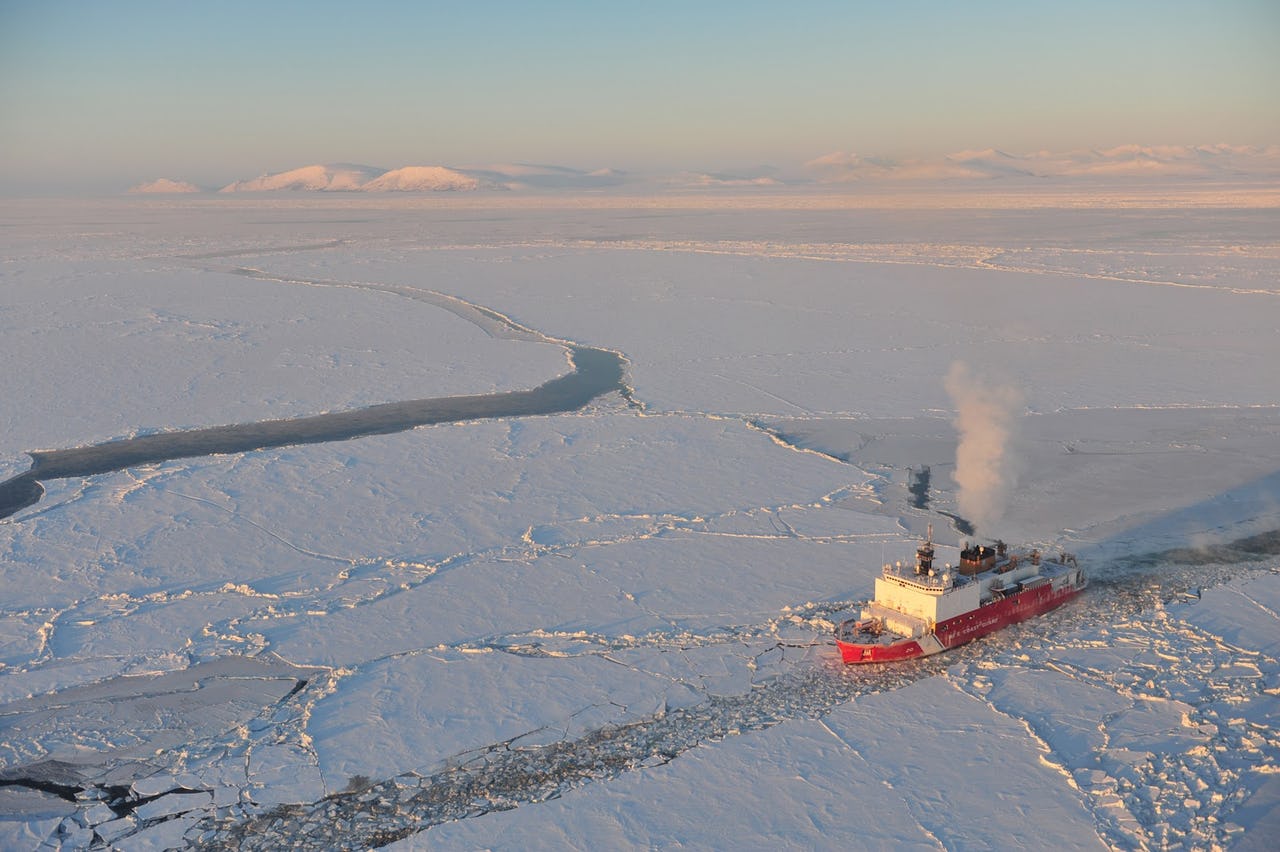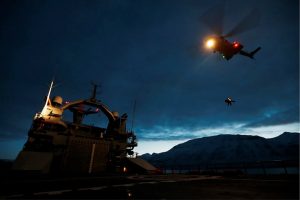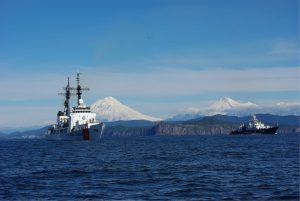The Arctic Coast Guard Forum: Big Tasks, Small Solutions

The Kigluaik Mountains are visible as the Coast Guard Cutter Healy breaks ice for the Russian tanker Renda near Nome Jan. 13, 2012. Photo: U.S. Coast Guard
The Arctic Coast Guard Forum was officially established on Friday, at the US Coast Guard Academy in Connecticut. Some have argued it can serve as an arena to tackle security dialogue with Russia, at a time when other channels have been disbanded. Yet, there are certain constraints with regards to coast guards and their roles and mandates in the Arctic. In turn, what will this Forum aspire to accomplish?
Why? – Maritime Challenges
Although difficult to generalize across the Arctic, research points to a trend of increased maritime activity in the various Arctic regions. A majority of this traffic derives from intra-Arctic shipping and destinational shipping to the Arctic in itself. The trans-Arctic sea routes themselves are less relevant for the traffic numbers, as they have yet to become fully operational.1)

With this increase of maritime activity, the Arctic coastal states are compelled to provide new capacities and improve their capabilities. Search and rescue, environmental protection (hereunder oil spill response) and aid to navigation are immediate tasks that require a maritime presence. Similarly, border control, fisheries inspections and general constabulary tasks follow, as the coastal states are intent on safeguarding their sovereign rights. Finally, maritime domain awareness is essential to ensure that the states’ borders are not breached and unwanted activity is prevented.2)
How? – International Cooperation
International cooperation has been promoted as a measure to deal with some of the challenges listed above. In 2011, the eight Arctic countries signed an agreement for search and rescue under the auspices of the Arctic Council. A similar agreement on oil spill preparedness was signed two years later, in 2013.3) Although a sign of cooperation, these agreements have been criticized for having limited impact in the Arctic, mainly outlining existing responsibilities and boundaries.4) The coast guards themselves have also pointed out that an increased number of exercises and more regular contact between practitioners are needed to operationalize the agreements.5)
In 2011 the Center for Strategic & International Studies (CSIS) proposed establishing a dedicated forum for Arctic coast guards. 6) Modeled on already existing forums for the North Pacific and the North Atlantic, American and Russian officials subsequently took the first steps towards its establishment.7) Yet, after Russia’s annexation of Crimea in March of 2014, the process came to a standstill, as representatives from the Russia were not included in two experts meetings held in Sydney, Canada, in 2014.
Another experts meeting was held in Washington DC in March 2015 – this time with the Russian Coast Guard present. The eight countries decided to push ahead, and the Arctic Coast Guard Forum was formally established on October 30th, 2015, at the US Coast Guard Academy in New London, Connecticut.8)
The structure of the Forum is quite simple. It will have a rotating Chair, currently held by the US, in tandem with the Chair of the Arctic Council. Thus, the Finnish Coast Guard is set to take over the reins in 2017. The heads of the coast guards will convene annually, whereas working groups will meet more frequently when needed. Aiming to avoid a heavy bureaucracy, there are only two working groups, namely a secretariat and the ‘combined operations’ group. The latter will be concerned with tasks such as joint operations, asset sharing and increased focus on exercises. Starting with search and rescue, the Forum will expand in scope as work gets underway. It aims at developing common situational awareness between the eight members, while also tapping into the work done in the Emergency Prevention, Preparedness & Response (EPPR) working group of the Arctic Council.
| Country | Name | Organization | Civilian/Military |
|---|---|---|---|
| USA | United States Coast Guard (USCG) | Department of Homeland Security | Semi-military* |
| Canada | Canadian Coast Guard (CCG) | Department of Fisheries and Oceans | Civilian |
| Denmark/Greenland | Søværnet (1. eskadre) | Royal Danish Navy | Military |
| Norway | Kystvakten | Royal Norwegian Navy | Military |
| Sweden | Kustbevakningen | Ministry of Defence | Civilian |
| Iceland | Landhelgisgæsla | Ministry of Justice | Semi-military |
| Finland | Rajavartiolaitos | Ministry of the Interior | Semi-military |
| Russia | Coast Guard of the Border Service | Federal Security Service (FSB) | Semi-military |
* The USCG is part of the US Armed Forces. Yet, it is dissimilar from the Navy and the Danish/Norwegian counterparts operating under Navy structures. As such, goes into the category of ‘semi-military’, a category broad in scope, which entail military attributes/affiliation, yet operating distinct from the military in peacetime.
Russia
In addition to the challenges outlined above, the integration of Russia in an Arctic Coast Guard Forum is crucial, albeit challenging. In both the Bering Sea and the Chukchi Sea, and through the Bering Strait, Russia and the United States share an extensive maritime border. Similarly, in the Barents Sea, Russia and Norway share an extensive and predominantly ice-free maritime border. Finland also shares a maritime border with Russia in the Gulf of Finland, albeit smaller in size and not in the Arctic. In all these border areas, cooperation is essential to effectively manage straddling fish stocks and provide environmental protection and search and rescue response.
In the initial pre-meetings for an Arctic Coast Guard Forum it thus became clear that Russian participation would be vital for the Forum’s relevance. Partly because of Russia’s extensive coastline and responsibilities along the Northeast Passage, and partly because of Russia’s shared maritime borders as outlined above. A possible expansion of coast guard collaboration in all these areas would be dependent on both diplomacy and cooperation with Russia.

At the same time, Russia’s participation has already led to a bumpy start for the Forum, and collaboration will have its inherent limitations. Sensitive information cannot be shared as between NATO members (and Finland/Sweden). It is also possible that some of the Arctic states will place strict guidelines on the role of their coast guard representatives in collaboration with Russian representatives. Yet, how much the Forum will be hampered by the contemporary political situation ultimately rests on the overall relationship between Russia and the other Arctic states, and their willingness to keep this venue sheltered.9)
What, then, will the Arctic Coast Guard Forum do?
Given the limitations listed above, what can and will the Arctic Coast Guard Forum be focusing on? The stated purpose of the Forum is to develop the relationships between the Arctic states on a practical level, to form a community focused on operational activities. In a crisis situation, familiarity with your coast guard neighbors is crucial. For example, when a South Korean fishing vessel sunk in the Bering Sea off the Russian coast in November 2014, the Russian Kamchatka Border Guard District requested US assistance. Several US Coast Guard assets participated in the search for survivors, under Russian coordination.10) This example highlights the operational collaboration already taking place between the US and Russian coast guards in the north.
The Arctic Coast Guard Forum can help enhance this collaboration as activity increase. Particularly the sharing of information and identification of so-called ‘best practice’ are areas of focus for the Forum, which can help tackle the overarching capability and capacity problems in the Arctic. The Arctic Coast Guard Forum can also act as a platform to initiate cross-border exercises, implementing the circumpolar agreements from 2011 and 2013. This work must subsequently also be done in coordination with the Arctic Council EPPR working group. Joint contingency exercises in the Arctic has increased slightly in frequency, but a leading organization is necessary for long-term strategic planning.11)
In the long-term, the forum will also be able to contribute further by providing strategic direction to emerging issues within coast guard area, in tandem with the overall work that takes place under umbrellas such as the Arctic Council and the International Maritime Organization (IMO).
Conclusion
The Arctic states and their respective coast guards are under mounting pressure. Cooperating with neighboring coast guards – formalized through the establishment of an Arctic Coast Guard Forum – can help provide some remedy to these challenges. Its establishment is an accomplishment, given the current political environment.
Yet, there are limitations to what international collaboration can achieve. The distances in the Arctic, variations in mandates and priorities amongst the coast guards, and the difficult political environment with regards to Russia confines what an Arctic Coast Guard Forum can achieve.
In an abundance of Arctic institutions, this Forum is nonetheless an arena from which to explore further cooperation, as a preemptive measure ahead of a major incident. It adds another layer to the governance of the region, ideally taking a step beyond the conference rooms and into real-life operations and practical action.
References